Was Jesus' birthday chosen to blend in with the Pagan Solstice festivals?
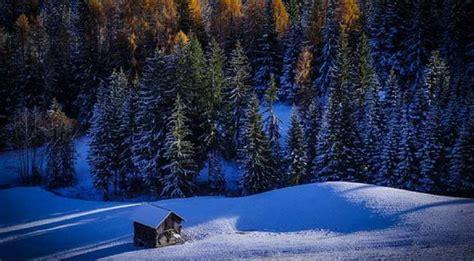
Winter Solstice in the northern hemisphere begins on Dec. 21, 2021 @ 9:59 am CST. Our earth and its inhabitants go into a period of rest.
By Carolyn Yeager
OF COURSE IT WAS, would be my answer to the title question. That the two occur at the same time cannot be accidental. The Solstice came first, of course, because it's an effect of the earth's rotation on it's axis – it occurs when the angle of the earth relative to the sun reaches its farthest southern point. Every year at this turning point, each day has a little more daylight until we reach the Summer Solstice – although the temperatures still get colder for awhile. During the three winter months – January-February-March – the earth is at rest and little outdoor work can be done.
Because humankind noticed that this phenomena reliably occurred, certain sacred and nature celebrations preceded the Christian Christmas (Christ Mass) by a long way. According to Wikipedia, “the first recorded Christmas celebration was in Rome on Dec. 25, in the year 336.”
Various factors contributed to the selection of December 25 as a date of celebration: it was the date of the winter solstice on the Roman calendar and it was nine months after March 25, the date of the vernal [spring] equinox and a date linked to the conception of Jesus (celebrated as the Feast of the Annunciation). Melton, J. Gordon (2011). Religious Celebrations: An Encyclopedia of Holidays, Festivals, Solemn Observances, and Spiritual Commemorations [2 volumes]. The March 25 date, which tied together the beginning of Mary's pregnancy and the incarnation of God in Jesus as occurring nine months before Christmas (December 25), supplied the rationale for setting the beginning of the ecclesiastical and legal year.
I found it interesting that in a late fourth-century sermon, Saint Augustine explains why this was a fitting day to celebrate Christ's nativity:
"Hence it is that He was born on the day which is the shortest in our earthly reckoning and from which subsequent days begin to increase in length. He, therefore, who bent low and lifted us up chose the shortest day, yet the one whence light begins to increase."
Issac Newton, who, coincidentally, was born on December 25, argued that the date of Christmas may have been selected to correspond with the solstice.
They who began first to celebrate them, placed them in the cardinal periods of the year; as the annunciation of the Virgin Mary, on the 25th of March, which when Julius Cæsar corrected the Calendar was the vernal Equinox; the feast of John Baptist on the 24th of June, which was the summer Solstice; the feast of St. Michael on Sept. 29, which was the autumnal Equinox; and the birth of Christ on the winter Solstice, Decemb. 25, with the feasts of St. Stephen, St. John and the Innocents, as near it as they could place them. And because the Solstice in time removed from the 25th of December to the 24th, the 23d, the 22d, and so on backwards, hence some in the following centuries placed the birth of Christ on Decemb. 23, and at length on Decemb. 20: and for the same reason they seem to have set the feast of St. Thomas on Decemb. 21, and that of St. Matthew on Sept. 21. […] All which shews that these days were fixed in the first Christian Calendars by Mathematicians at pleasure, without any ground in tradition; and that the Christians afterwards took up with what they found in the Calendars. http://www.gutenberg.org/files/16878/16878-h/16878-h.htm [Chapt. XI]
Among the existing pagan celebrations created by Europeans were Saturnalia and Natalis Invicti and of the Feast of Juul (Yule, derived from the Norse word jól), a pre-Christian festival observed in Scandinavia and all Germanic lands at the time of the December solstice. We have to appreciate how really dark it was in those northern lands with no electric light, and how long it lasted!
Yule may be the oldest celebration of wintertime in the world
A Yule or Juul log was brought in and burned on the hearth in honor of the Scandinavian god Thor.
A piece of the log was kept as both a token of good luck and as kindling for the following year’s log. In England, Germany, France, and other European countries, the Yule log was burned until nothing but ash remained. The ashes were then collected and either strewn on the fields as fertilizer or kept as a charm and or as medicine.
Yule is also celebrated as one of the “Lesser Sabbats” of the Wiccan year, honoring the ancient belief in the rebirth of the Sun God and days with more light. This took place annually around the time of the December solstice and lasted for 12 days.
Natalis Solis Invicti
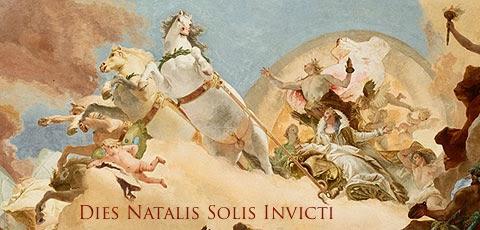
“Birthday of the Unconquerable Sun” is a winter solstice holiday celebrated on December 25th, in dedication to King Helios (also known as Zeus, Jupiter and Jove.) It was a Roman feast day observed when the cold winter is defeated and the sun is reborn once again. A celebration to Mithras, a Hellenic Savior God of the light, truth, oaths, integrity and covenants also occurs on the same day. He is a guardian Solar Deity who presides over a path for the perfection of the Soul. (from https://hellenicfaith.com/dies-natalis-solis-invicti/)
Saturnalia in Ancient Rome
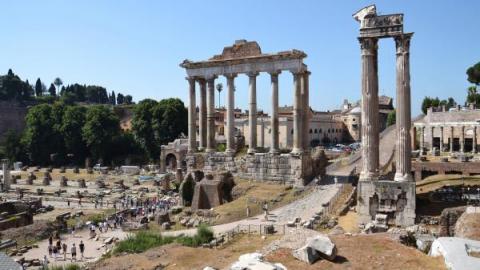
The eight remaining columns of the Temple of Saturn in Rome (center).
In Ancient Rome, Saturnalian banquets were held from as far back as around 217 BCE. The festival began on December 17 and lasted for seven days (thus always during the Solstice). It was held in honor of Saturn, the father of the gods and was characterized by the suspension of discipline and reversal of the usual order. This source reports that “grudges and quarrels were forgotten while businesses, courts, and schools were closed. Wars were interrupted or postponed, and slaves were served by their masters. Masquerades often occurred during this time.
l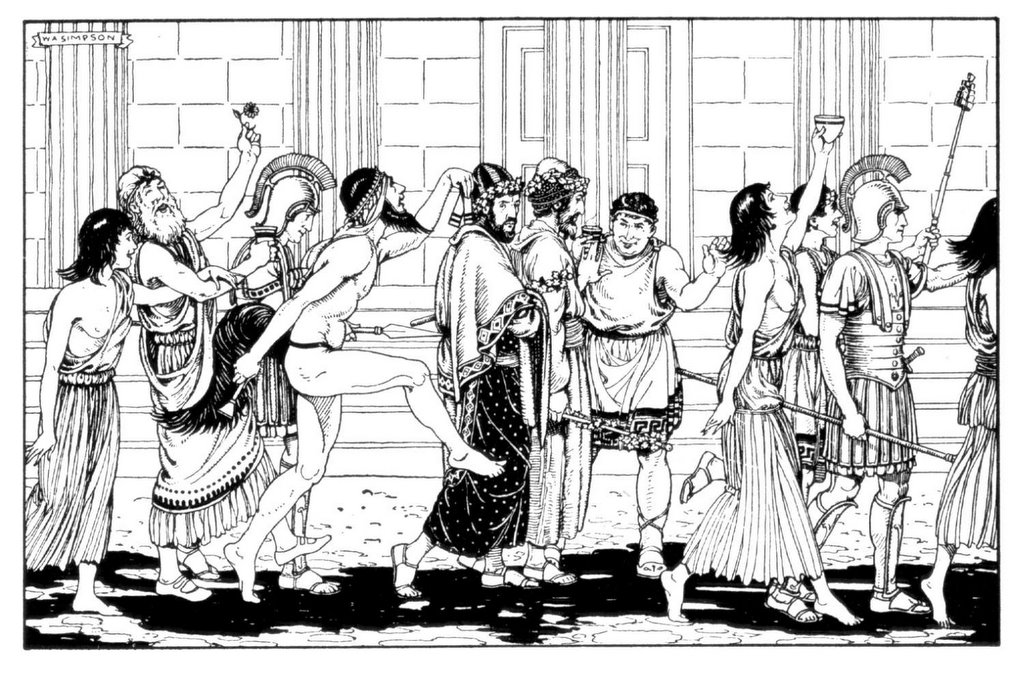 The Saturnalia eventually degenerated into a week-long spree of debauchery and crime ...
The Saturnalia eventually degenerated into a week-long spree of debauchery and crime ...
It was traditional to offer gifts of imitation fruit (a symbol of fertility), dolls (symbolic of the custom of human sacrifice), and candles (reminiscent of the bonfires traditionally associated with pagan solstice celebrations). A mock king was chosen, usually from a group of slaves or criminals, and although he was permitted to behave in an unrestrained manner for seven days of the festival, he was usually killed at the end. The Saturnalia eventually degenerated into a week-long spree of debauchery and crime – giving rise to the modern use of the term saturnalia, meaning a period of unrestrained license and revelry.
Sacred Solstice?
It's noted that many celebrations of the Sacred fall very close to the Summer and Winter Solstices and, to a lesser extent, the Spring and Fall equinoxes. Equinox means equal, meaning day and night are of nearly equal length across the planet – the equator being closest to the sun at that time. The Spring equinox (end of March) is the time of planting in the Northern Hemisphere, while the Fall equinox (end of September) marks the harvest.
As stated above, this is not accidental as physical life on our planet is totally dependent on the Sun. Why wouldn't we worship that amazing, life-giving orb and celebrate with gratitude it's constancy. We should. It's us (our earth) that tilts back and forth, creating the seasons. The sun never moves or changes. Enjoy this blessed season of rest we're given before nature's rebirth of activity in Spring.
Happy Yuletide to you all.
Tags
Christmas, Winter Solstice- 1296 reads

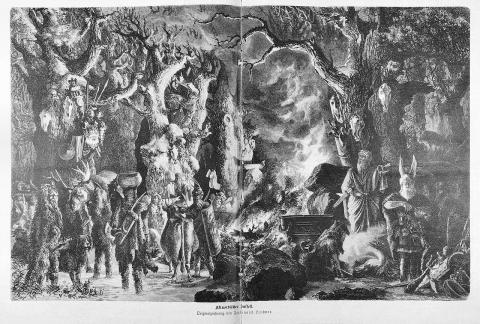









Comments
Saturnalia truce?
Interesting that they call the WWI truce, a Christmas truce, when it seems inspired by Saturnalia, instead.
“grudges and quarrels were forgotten while businesses, courts, and schools were closed. Wars were interrupted or postponed, and slaves were served by their masters."
Yes, as we say in sweden, God
Yes, as we say in sweden, God Jul! Thank you so much for all the things you have done to inform people. Most are totally brain washed and do not get it, but there are methods to do de-programing, so it is just a matter of time
Dear Carolyn,
Dear Carolyn,
thank you for this wonderful essay about our favorite time of the year and its Nordic roots.
Happy Yuletide to you
You are quite the rare gem
You are quite the rare gem,Carolyn. Very few women(or men) of your age know, or care of such things. White people are in bad shape because our native spirituality has been denied us.
Thanks Powell. I'm finding
Thanks Powell. I'm finding further reading on this topic interesting and enjoyable. Here's something I just looked at here: https://www.bibletools.org/index.cfm/fuseaction/Topical.show/RTD/CGG/ID/783/Saturnalia.htm
Many historical sources show that Christmas was not observed by Christians from Christ's time to about AD 300. Saturnalia (December 17-24) and Brumalia (December 25) continued as pagan celebrations by the Romans well into the fourth century. The Catholic Encyclopedia, 1911 edition, in the article "Natal Day," records that the early Catholic church father, Origen, acknowledged:
During the fourth century, the emperor Constantine "converted" to "Christianity" and changed Sabbath keeping from the seventh to the first day of the week. Sunday was the day he had worshipped the sun as his god. This made it easier for the Romans to call their pagan December 25th winter solstice festival, in which they had celebrated the birth of the sun god, the birthday of the "Son of God."
The New Catholic Encyclopedia, 1967, says:
Only in the fifth century did the Roman Catholic Church order that the birth of Christ be observed on December 25, the day of the old Roman feast of the birth of Sol, the sun god. They renamed this day "Christmas."
Martin G. Collins
It's interesting the birth day of Christ, which originally was unimportant, grew to overshadow both the Day of the Conception (Annunciation) and the Day of the Death (Passion) of Christ in the minds of the folk. I guess because it can be better commercialized than the others! People want to have a gay time. Eat and drink!
Similarly to the cult of
Similarly to the cult of saints, with each saint assigned a certain group of people, mimicking nearly all Proto-Indo-European religions in which specific gods were entrusted with farmers, builders, warriors, doctors, etc. European spirituality was subverted in many ways and God knows how much has been destroyed in the process. And unfortunately this leaves us very little to fall back upon. Christianity (especially in its present version) is bad, secularism even worse, etc. "Authentic" pagan worship feels quite eccentric to many. I believe Alfred Rosenberg spoke of the need of a genius who would restore European spirituality, complete with a myth, etc... though of course such a prophet who would bring about the needed philosophical and religious developments can only flourish in a National Socialist environment. These are indeed dark times... but I do have hope that Ananke favors the holy and the noble.
“I have nothing against
“I have nothing against celebrating Christmas. I even give high marks to the clever thinking of the Roman Church fathers, who did not abolish the most solemn holiday of the Nordic world, the day when the sun is at its lowest point and from that moment on begins to rise on the horizon. Instead, they moved the birth of Christ to this day, turning a NATURE FESTIVAL of the Old Germanic people into Christ’s day. By the way, this shows us that a high percentage of Germanic tribes were part of Romans Christendom and that Rome found it necessary to win them over in particular by using this device.“Now, why shouldn’t our young people be led back to NATURE? After all, in nature, this turning point is a day that presents a truly momentous event: the vanquishing of the night, which has grown ever longer and darker, by the rebirth of daylight, awakening new hope, new life, new strength! And since today’s elementary schools already teach the motion of the planets and the causes of summer and winter, the midnight sun and the YULETIDE FESTIVAL are cosmic concepts already familiar to young people. But NO ONE CAN SAY WITH CERTAINTY WHETHER CHRIST WAS OR WAS NOT BORN ON THIS PARTICULAR DAY. At least, there is no mention in the Bible of when and if he celebrated his birthday. And it Is certain that he knew nothing of this Christmas holiday.“But we do not want to rob the church of its holy days. The mere fact that schools are closed on such days gives children much pleasure. But this does not prevent us from leading children, NOT INTO CHURCHES fragrant with incense, but into the great outdoors, to show them the powerful workings of divine creation and make vivid to them the eternal rotation of the earth and the world and life, where the struggle against the powers of darkness is constantly repeated, culminating in the victory of the forces of light, which are creative, awakening a budding spring from frosty winter, bringing new joy in life, new life, and renewed creative forces" — Adolf Hitler, Hitler Memoirs of a Confidant by Otto Wagener, p.278